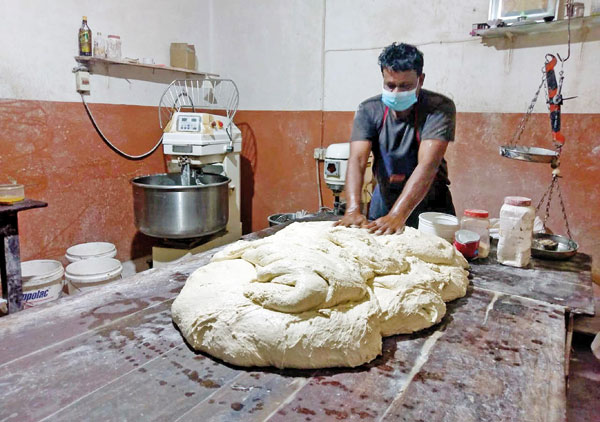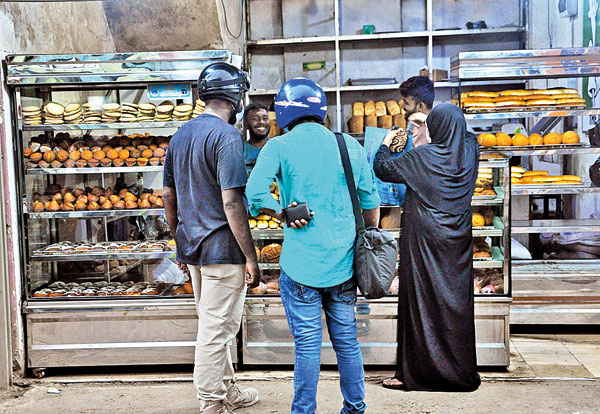News
Battered bakers going out of business
On the official Facebook page of the All Ceylon Bakery Owners’ Association, some members are selling their entire kitchens–ovens, mixers, tables and showcases. Others are hawking firewood.
Gas, electricity and flour shortages have hit the industry hard along with acute increases in the prices of raw materials. And bakers–particularly hundreds of small and medium-scale ones–say uncertain economic indicators make it near impossible to plan their futures.
In 2019, Chaminda Palitha Randeniya returned from South Korea to vote for Gotabaya Rajapaksa. “Viruwata chandey deela lankawe newathuna,” the 39-year-old said: “I voted for the hero and stayed back in Sri Lanka.”

Small and medium-scale bakers say uncertain economic indicators make it near impossible to plan their futures. Pic by Indika Handuwala
Mr Randeniya had worked for a baked goods company while abroad. Using his experience, he opened a bakery in his home town of Tambalagmuwa in Mollipathana, Kantale. “I invested the dollars I had earned and started this enterprise without any Government assistance,” he said.
Sama Bakery now has two outlets with three workers and two ‘choon pan’ three-wheelers. It sells bread, buns and short eats. Last week’s gas shortage forced Mr Randeniya to close down for five to six days. He had found gas by yesterday but sees no solution to escalating costs. Everything–from flour, margarine and yeast to diesel for his ‘choon pan’ vehicles–has skyrocketed in price.
“They’re going up unnaturally,” said 36-year-old Mr Randeniya, whose two children are aged seven and two. “In six months, a 50kg sack of flour rose from Rs 4,500 to Rs 8,000. A loaf of bread was between Rs 55 and 60. Now it’s Rs 130. Will people buy at these prices? Business has already halved. And in my area, not a single restaurant is open now because of the gas shortage.”
Hettiarachchi Bake House is a small operation at Welipenna in Gahamulla, Kuliyapitiya. Chanaka Sanjeewa comes from a family of bakers and has two gas ovens that use up a 12.5kg LPG tank per day. He started ‘choon pan’ one-and-half years ago, in addition to supplying baked goods outlets, but has stopped as it is too dear to run. He was still closed owing to the gas shortage and, not only has flour become prohibitively expensive, he cannot get his hands on it.
“The total cost is more than I can afford,” Mr Sanjeewa, whose son is three-years-old, said. “I really can’t imagine what to do. I had two three-wheelers. I sold one and fixed the ‘choon pan’ cages onto the other. Now that’s just parked at home. I’m wondering whether to dismantle the cages and sell it off, too.”
Mr Sanjeewa mixes and bakes by himself. “Think of those who employ other workers,” he said. “They have to pay salaries and meet their other expenses. The price of gas rose for Rs 1,200 to Rs 2,700 almost overnight. I sold bread for between Rs 60 and 65, then it increased to Rs 80 and now it’s Rs 110. The problem is that there is no sign of a solution.”
Waiting in a gas queue in Elpitiya yesterday was M. C. Pradeep. Along with a partner, he started the N M J Bakery around eight months ago. They had planned to open another a week ago and had bought all the equipment. They even got an auspicious time from an astrologer. But they couldn’t find gas. So they did not go ahead.
“The gas and flour problem is serious,” the 29-year-old sighed. His income earlier was largely from his cinnamon plantation but that was crippled by the agrochemicals ban. “A 50kg sack of fertiliser suddenly went from Rs 2,650 to Rs 8,000,” he said. “An acre needs eight to nine sacks. So I didn’t fertilise the plantation. To earn income, we started the bakery.”
Anuradha Manjula Kumara was in a three-wheeler en route from Kandapola to Kandy to search for gas. So he couldn’t speak long. He said he ran a bakery and restaurant, both of which he had started with money earned in Qatar.
One large-scale entrepreneur from Katugastota was calculating costs when the Sunday Times called. He worked for years in bakery supplies before starting his own business in 2005 with one wood-fired oven. Today he needs 600 sacks of flour a month, deploys a fleet of lorries, runs several outlets and has four diesel ovens. And he employs around 100 people.
“I got 20 sacks of flour yesterday after three days,” he said, asking to remain anonymous. “But we still have no gas. I have closed some outlets. I have a costing model and I have been entering into it all the prices that went up from yesterday. Usually, we update it only every three months. I’ve had to do it several times now.”

Flour-based items have all gone up in price. Pic by Nilan Maligaspe
“My diesel expense alone has increased by Rs 600,000 a month and flour by Rs 1.5mn a month,” he said. “One kilogramme of cake that cost Rs 450 is Rs 650, overnight. Usually, gas is delivered to the door. I offered to the area manager to send a lorry to pick some up. He told me first priority is to crematoriums and second is to hotels that have guests. We are not considered an essential category’.”
There is pressure on this businessman now to migrate, particularly from friends and family. With his background, and that of his wife, who works in the health sector, he has prospects. But he feels a pang to leave the operation he built up from scratch and his employees, some of whom “work for this company as if it’s their own”.
While he isn’t bankrupted by supplies shortages and costs, he admits that his margins are severely eroded.
Ruwin de Silva, a 25-year-old management graduate, owns a bakery in Ragama that he set up in his first year of university: “To be my own boss”. He has one gas oven but is now contemplating shifting to wood-fired. “People aspire to go forward by graduating to gas but here we go backwards,” he laughed.
“This was a good, profitable field when I started out,” Mr de Silva said. “It earns more than hotels or groceries. And I didn’t need heavy capital, around Rs 6-700,000 for equipment, excluding land and building. Today, machinery is five times that cost. How can anyone start anew, let alone expand?”
Mr de Silva has four workers. He does ‘choon pan’ and sells products to other outlets. With the ongoing crisis, he cannot cater to demand.
“I’ve been going at 4 a.m. to the only shop in Kadawatha that has gas,” he recounted. “By then, there are already 50 in the queue. They issue only 80 tanks. It’s over by 10.30 a.m. This is an outlet that sold gas 24 hours a day.”
Mr de Silva has no idea whether the country’s gas stocks are available or finished or when they would be replenished. The confusion affects planning. Additionally, he points to a thriving black market in flour. The agencies, he says, distributes only around 50 percent of their stocks. The rest they sell to wholesalers for a higher price. The wholesalers hike it up even more and retails.
“Registered bakers are being told flour isn’t available and directed to the wholesale market in Welisara,” he maintained. “The government isn’t regulating this.” We could not independently verify the claim but there were reports, too, of a thriving black market trade in gas.
Mr de Silva has hopes prices and shortages will “normalise” when the rupee stabilises against the dollar. For now, his costs have increased 50-60 percent in six months. But revenue has risen only marginally. That is why some bakeries are seen retrenching workers.
The slew of secondhand bakery equipment being advertised is an indication of just how badly the industry is doing, he said: “Nobody has extra ovens to sell. What is being sold are used items. Some people are selling their entire bakeries. And bakeries in outstation areas are the worst hit. They have no flour at all.”
The best way to say that you found the home of your dreams is by finding it on Hitad.lk. We have listings for apartments for sale or rent in Sri Lanka, no matter what locale you're looking for! Whether you live in Colombo, Galle, Kandy, Matara, Jaffna and more - we've got them all!

